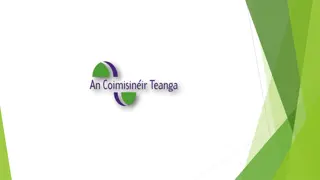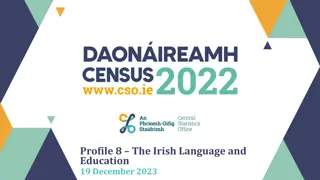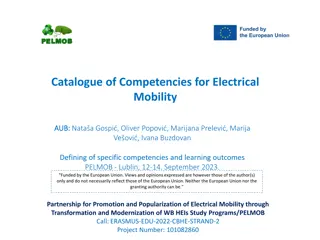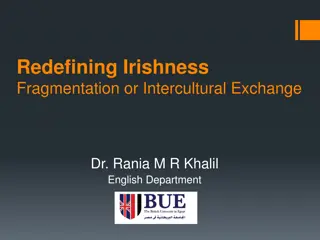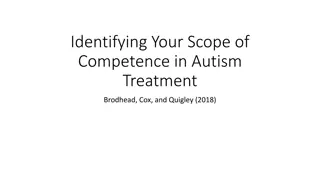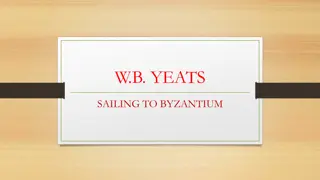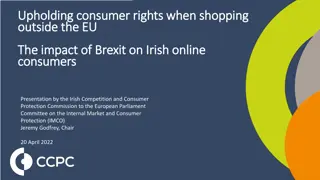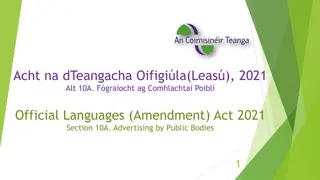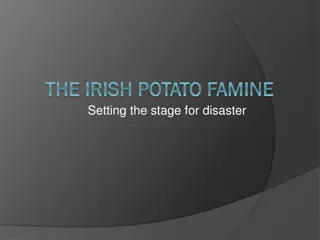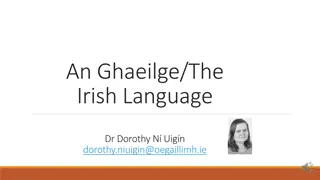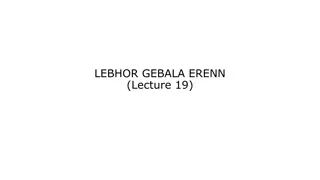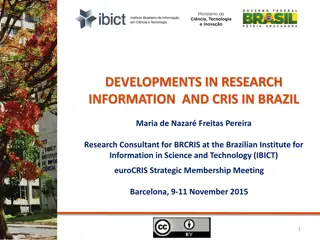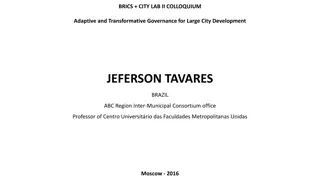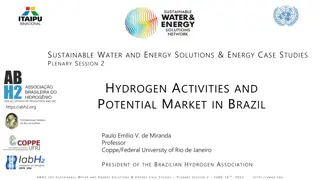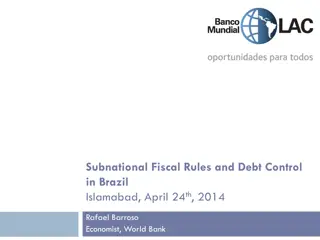The Gillick Competence in Irish Law: A Unified Approach by Patricia Brazil BL
The right of competent children and young people to make decisions for themselves poses complex legal, philosophical, and ethical questions. Various sources such as the CRC, Constitution, statute, and case law inform the resolution of issues related to consent for medical treatment and decision-making rights. International conventions emphasize the importance of children's views and participation in decision-making processes, including access to confidential medical counseling and advice. The Committee on the Rights of the Child advocates for empowering children to express informed views on their treatment.
Download Presentation

Please find below an Image/Link to download the presentation.
The content on the website is provided AS IS for your information and personal use only. It may not be sold, licensed, or shared on other websites without obtaining consent from the author. Download presentation by click this link. If you encounter any issues during the download, it is possible that the publisher has removed the file from their server.
E N D
Presentation Transcript
GILLICK COMPETENCE IN IRISH LAW: THE NEED FOR A UNIFIED APPROACH PATRICIA BRAZIL BL
INTRODUCTION The nature and extent of the right of competent children and young people to make decisions for themselves raise complex legal, philosophical and ethical questions Range of competing sources informing the resolution of these questions CRC, Constitution, statute, case law When does a competent young person have the right to consent to, or refuse, medical treatment? When can that decision be overridden by the young person s guardians or the court?
CONVENTION ON THE RIGHTS OF THE CHILD Article 12: 1. States Parties shall assure to the child who is capable of forming his or her own views the right to express those views freely in all matters affecting the child, the views of the child being given due weight in accordance with the age and maturity of the child. 2. For this purpose, the child shall in particular be provided the opportunity to be heard in any judicial and administrative proceedings affecting the child, either directly, or through a representative or an appropriate body, in a manner consistent with the procedural rules of national law.
COMMITTEE ON THE RIGHTS OF THE CHILD General Comment No.12 on the right of the child to be heard: 100. Children, including young children, should be included in decision-making processes, in a manner consistent with their evolving capacities. They should be provided with information about proposed treatments and their effects and outcomes, including in formats appropriate and accessible to children with disabilities. 101. States parties need to introduce legislation or regulations to ensure that children have access to confidential medical counselling and advice without parental consent, irrespective of the child s age, where this is needed for the child s safety or well-being. Children may need such access, for example, where they are experiencing violence or abuse at home, or in need of reproductive health education or services, or in case of conflicts between parents and the child over access to health services. The right to counselling and advice is distinct from the right to give medical consent and should not be subject to any age limit.
COMMITTEE ON THE RIGHTS OF THE CHILD 102. The Committee welcomes the introduction in some countries of a fixed age at which the right to consent transfers to the child, and encourages States parties to give consideration to the introduction of such legislation. Thus, children above that age have an entitlement to give consent without the requirement for any individual professional assessment of capacity after consultation with an independent and competent expert. However, the Committee strongly recommends that States parties ensure that, where a younger child can demonstrate capacity to express an informed view on her or his treatment, this view is given due weight.
CONSTITUTION OF IRELAND Article 41: Special protection afforded to the family based on marriage (although note recent comments of O Donnell J in Gorry v Minister for Justice [2020] IESC 55) Concept of a zone of autonomy conferred on parents to make decisions on behalf of the family, including in respect of medical treatment North Western Health Board v HW & CW [2001] 3 IR 622
CONSTITUTION OF IRELAND Article 42A: 1 The State recognises and affirms the natural and imprescriptible rights of all children and shall, as far as practicable, by its laws protect and vindicate those rights. 2 1 In exceptional cases, where the parents, regardless of their marital status, fail in their duty towards their children to such extent that the safety or welfare of any of their children is likely to be prejudicially affected, the State as guardian of the common good shall, by proportionate means as provided by law, endeavour to supply the place of the parents, but always with due regard for the natural and imprescriptible rights of the child.
CONSTITUTION OF IRELAND 4 1 Provision shall be made by law that in the resolution of all proceedings i safety and welfare of any child from being prejudicially affected, or brought by the State, as guardian of the common good, for the purpose of preventing the ii concerning the adoption, guardianship or custody of, or access to, any child, the best interests of the child shall be the paramount consideration. 2 Provision shall be made by law for securing, as far as practicable, that in all proceedings referred to in subsection 1 of this section in respect of any child who is capable of forming his or her own views, the views of the child shall be ascertained and given due weight having regard to the age and maturity of the child.
IRELANDS MOST RECENT REVIEW BEFORE CRC Anything on evolving capacity?
GILLICK COMPETENCE Gillick v West Norfolk and Wisbech AHA [1986] AC 112 application by mother of children under 16 for declaration that they could not be prescribed oral contraceptive pill without her knowledge or consent House of Lords decision was that minors under the age of 16 had a right to consent to medical treatment subject to sufficient understanding of what was involved: [T]he parental right to determine whether or not their minor child below the age of 16 will have medical treatment terminates if and when the child achieves a sufficient understanding and intelligence to enable him or her to understand fully what is proposed.
GILLICK COMPETENCE Lord Fraser set out a number of conditions that must be satisfied before a doctor could give contraceptive advice to a girl under 16: i. That she will understand the advice; ii. The doctor cannot persuade her to inform her parents or to allow the doctor to inform the parents that she is seeking contraceptive advice; iii. that she is very likely to continue having sexual intercourse with or without contraceptive treatment; iv. that unless she receives contraceptive advice or treatment her physical or mental health or both are likely to suffer; v. that her best interests require that she be given contraceptive advice, treatment or both without the parental consent.
GILLICK COMPETENCE Gillick competence subsequently extended to access to abortion in R (Axon) v Secretary of State for Health [2006] EWHC 37 (Admin) However subsequently English case law queried whether Gillick competence applied not just to decision to obtain treatment, but also decision to refuse treatment? Case law also queried applicability of Gillick competence to children under the wardship jurisdiction
STATUTE LAW There are a number of different statutory provisions that impact on the question of whether and when a mature young person under the age of 18 has capacity to make decisions without parental involvement: Non-Fatal Offences Against the Person Act 1997 Mental Health Act 2001 Gender Recognition Act 2015 Protection of Life During Pregnancy Act 2013 Health (Assisted Human Reproduction) Bill 2022
NON-FATAL OFFENCES AGAINST THE PERSON ACT 1997 Section 23: (1) The consent of a minor who has attained the age of 16 years to any surgical, medical or dental treatment which, in the absence of consent, would constitute a trespass to his or her person, shall be as effective as it would be if he or she were of full age; and where a minor has by virtue of this section given an effective consent to any treatment it shall not be necessary to obtain any consent for it from his or her parent or guardian. (2) In this section surgical, medical or dental treatment includes any procedure undertaken for the purposes of diagnosis, and this section applies to any procedure (including, in particular, the administration of an anaesthetic) which is ancillary to any treatment as it applies to that treatment.
NON-FATAL OFFENCES AGAINST THE PERSON ACT 1997 Not all types of medical care covered NB mental health care Does section 23 only operate in criminal context or also in civil? Does provision of treatment extend to refusal of treatment?
VALIDITY OF CONSENT OF UNDER 16S? Re XY [2013] IEHC 12 Concerned 15 year old detained under Mental Health Act and whether court should authorise taking of blood samples against child s wishes. Consideration of Gillick test by Birmingham J without definitive conclusion on its place in Irish law: Even assuming, for this purpose only, that the concept of Gillick competent forms part of Irish law, it is clear that XY is not in fact Gillick competent .
VALIDITY OF CONSENT OF UNDER 16S? Birmingham J also suggested there was a distinction between capacity to consent to medical treatment, and capacity to refuse medical treatment Mills & Mulligan in Medical Law in Ireland (Butterworths Professional 2016) suggest that following XY, while Irish law may be willing to recognise that a minor under the age of 16 could have the capacity to consent, it does not mean that that minor will be the sole decision-making agent in relation to his or her care and that it seems arguable that the courts would recognise a qualified right to consent in the case of mature under-16s.
REFUSAL OF TREATMENT BY OVER-16S CFA v AM [2016] IEHC 749: Pursuant to Section 18 of the Child Care Act 1991, where a child is the subject of a care order, the Child and Family Agency can give consent to any necessary medical or psychiatric examination, treatment or assessment with respect to the child. In any proceedings before a court in relation to the care and protection of a child, the Court, having regard to the rights and duties of parents, whether under the Constitution or otherwise, shall in so far as is practicable, give due consideration, having regard to his age and understanding, to the wishes of the child. It is submitted that whilst the Court should give weight to AM s views in light of his age, the Court should override them in order to safeguard his health, safety and wellbeing in light of the overwhelming medical evidence before the Court.
REFUSAL OF TREATMENT BY OVER-16S Similar finding made in In Re J (A Minor: Medical Treatment) [1992] 3 WLR 758: i. A minor of any age who is Gillick competent in the context of particular treatment has a right to consent to that treatment which again cannot be overridden by those with parental responsibility, but can be overridden by the Court. Unlike the statutory right this common law right extends to the donation of blood or organs. ii. No minor of whatever age has power by refusing consent to treatment to override a consent to treatment by someone who has parental responsibility for the minor and a fortiori a consent by the Court. Nevertheless such a refusal is a very important consideration in making clinical judgments and for parents and the Court in deciding whether themselves to give consent. Its importance increases with the age and maturity of the minor.
LAW REFORM COMMISSION The Law Reform Commission in Children and the Law: Medical Treatment (LRC 103-2011) recommended that there should be an express statutory right granted to 16- and 17-year olds to refuse medical treatment, but has also acknowledged that any decision to refuse lifesaving treatment should be subject to review by the courts: [The Commission] recommends that, in the context of refusal of life sustaining treatment by a person under the age of 18, an application may be made to the High Court to determine the validity of the refusal. The High Court may order treatment that is necessary to save life and where this is in the best interests of the person under 18 years of age. The Commission also recommends that in any such application the person under 18 shall be separately represented.
LIMITATIONS ON GILLICK COMPETENCE Re R (a minor) (wardship: consent to medical treatment) [1991] 4 All ER 177 Gillick test had no application in wardship cases, where the test was based on the best interests of the ward Hers is a limited autonomy. If she is sixteen her statutory right to authorise treatment cannot be overruled by parents even though their rights co-exist with her own until she is of full age, but if she objects to treatment, the power of parents or the court, can provide the necessary flak jacket and enable lawful treatment.
GILLICK UNDER FIRE: BELL V TAVISTOCK (EWHC) Bell v Tavistock [2020] EWHC 3274 concerned prescription of puberty-blocking drugs to trans young people under the age of 16 English High Court held it is highly unlikely that a child aged 13 or under would ever be Gillick competent to give consent to being treated with [puberty blockers]. In respect of children aged 14 or 15 we are also very doubtful that a child of this age could understand the long-term risks and consequences of treatment in such a way as to have sufficient understanding to give consent.
GILLICK RESTORED: BELL V TAVISTOCK (CA) [2021] EWCA Civ 1363: Appeal allowed [t]he ratio decidendi of Gillick was that it was for doctors and not judges to decide on the capacity of a person under 16 to consent to medical treatment. Nothing about the nature or implications of the treatment with puberty blockers allows for a real distinction to be made between the consideration of contraception in Gillick and of puberty blockers in this case, bearing in mind that when Gillick was decided 35 years ago, the issues it raised in respect of contraception for the under 16s were highly controversial in a way that is now hard to imagine.
GILLICK IN IRISH LAW A number of crucial key questions remain unclear in Irish law When can under 16s validly consent to, or decline, treatment? When can over 16s validly consent to, or decline treatment? When can parents or the courts override a young person s wishes? Answer depends in part on patchwork of legislative provisions, judicial dicta and ethical guidelines



